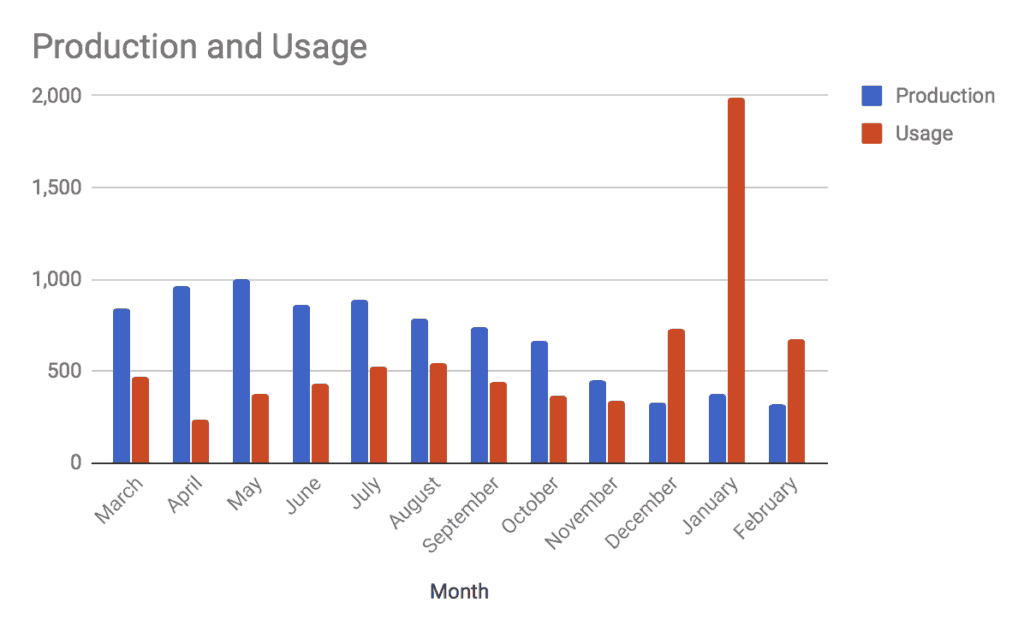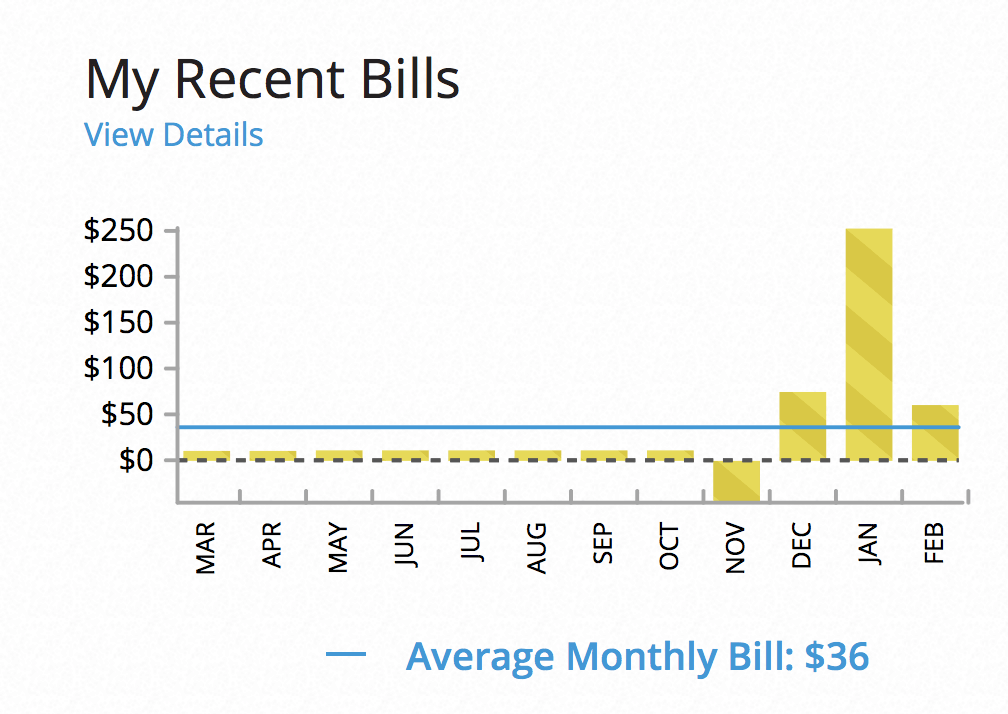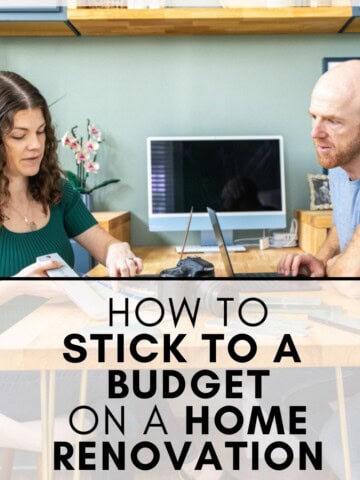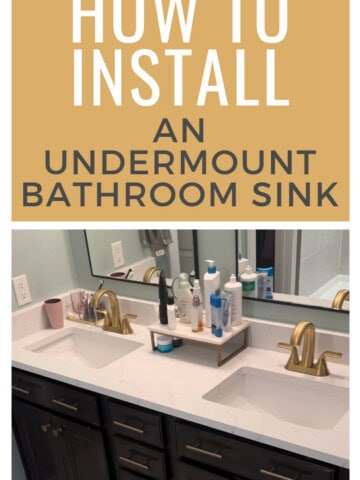If you're considering having solar panels installed on your home, a big question you may have is whether they are worth it. Here's our opinion after having two homes with solar panels!
Update- this review and experience is from our first home where WE chose to have the solar panels installed. Our second home already had solar panels when we bought it so they were included. If you can buy a home with solar panels already installed and paid for, that is a great option for long-term savings!
Well, we have now had our solar panels in action for one year. We wanted to wait until we had 12 months of statements so that we could really get nerdy on the facts with you.
In case you are interested, here is our post about how and why we got the solar panels. One of the biggest questions that we get is "are solar panels worth it?" So I decided to really break it down for you today!

What is the total cost of solar panels?
For us, the total cost was $29,000. This was set up as two loans (we put $0 down). One was a 0% 12 month loan for 30% of the total amount - this is the amount that we would get in the first year as a federal tax refund due to the tax credit.
Warning: if you normally owe taxes each year, you might not get the full credit as a refund. Talk to a tax professional.
The remainder of the cost was a loan at 2.99%. This gives us a monthly payment of around $145 for 12 years.
We have been paying a little bit extra plus putting the South Carolina tax credit (25% of the total cost, but is spread out as only $2,500 a year, over the course of 3 years) towards the balance. It's our goal to have the loan paid off in 5 years and the current balance is around $7,500.
*Update- we used a refund to pay off the solar panels way early so as to be done with the payments before we thought about selling our home. You won't really experience savings until the panels are paid off.
What do you pay each month?
We have a monthly loan payment (on the solar panels) of $145. That includes an 2.99% interest rate and we currently have a balance on there of around $7,500.
We also have to pay an $11.46 fee to SCE&G (our power company) each month. This is a "hook up" fee and honestly wasn't described to me in advance. I was told we would get no bill.
You'll notice this was a pattern in our experience. I don't know if I was deliberately misled or just didn't know the right questions to ask.
Finally, we have to pay for any electricity any month that we use in excess of our production, because the panels don't store excess energy we create in any other month. We've had to do that in December and January and February.
What has the production vs. usage been?

As you can see, most months we produced way more than we used. I would conclude from this year that the solar panels are fantastic in warm, sunny months and definitely cover our AC usage.
However, we are on a heat pump which uses a ton of power to create heat. We had a freak snow in January (once in a decade around here!) and people's energy bills were double-triple the average month across the board. I really wish that we were able to store and use some of that summer energy!
What do you get paid for any excess produced from solar panels? How does that work?

This was one of the biggest surprises for us. We knew that we produced a lot more than we used in the first 6 months.
However, when we got our overage statement (in November) we learned that while SCE&G charges us 12 cents per kwh, they only pay out about 3 cents per kwh. While not shocking, this was still very disappointing and seems very sketchy.
So for 1,624 kwh of excess produced, we received $57. This was paid to us as a credit towards our future bills, and you can see it as the negative bill in November. I wish that the KWH could have been saved and used as a credit based on KWH for the winter, but they made it a credit based on $ instead, so it only went about ¼ as far.
How do solar panels affect home insurance?
I didn't really consider this in advance (no one mentioned it to me and blame it on my first time home owner naivety), but our solar panel loan required us to add the solar panels to our home insurance policy.
Makes sense, since we still owe on them, that we need their value covered in case of an emergency. Well, we didn't think about it.
This year we got our escrow statement and found out that we owed almost $2,000 for last year and that our payments were going up over $150 a month due to insurance increases. While it wasn't entirely due to the solar panels, I was told that a lot of it was for that coverage. $150 a month is more than our monthly electric bill so that was honestly shocking and cancels out some positive impacts.
Can you store solar panel energy for using later?
I really think that I would feel so much happier with and better about our solar panels if we could store power ourselves with a backup battery. I have heard that technology is becoming more cost effective thanks to Tesla and I am really hopeful that that turns out to be a good option for people in the future.
A back up battery would allow you to have power during outages (huge since there is no natural gas in our neighborhood) and it would let you store all that excess and use it instead of being credited a tiny fraction of its "street value" and having to pay in months that you under-produce.
Right now, batteries are cost-prohibitive but would definitely be great to have. As things get better in the future, this will make solar panels more attractive.
Conclusion- are solar panels worth it for your home?
I have honestly been underwhelmed by the financial benefits of the solar panels. We are still paying a lot per month.
The overage payouts have been less lucrative than I had hoped. We have owed additional electric charges several times.
I am glad for the benefits to the earth of producing some clean energy and I am still hopeful that it will add long-term resale value to our home. (*update- when we sold this home, no one was interested in the solar panels and we were only able to raise the price by about $10,000 more than we would have without the panels, which isn't great.)
We also think that we'll feel better about them once we have completely paid them off, because we will only be receiving the small monthly admin charge at that point. But, so far, financially, it hasn't been a huge win.
Do you have any more questions for us?!

Hello, I'm Morgan, half of the creative force behind CharlestonCrafted.com! With a passion for DIY that dates back to 2012, I've transformed three homes and now I'm dedicated to helping others craft their dream spaces. Let's turn your house into a home together!











AOK says
You know it saddens me to hear someone describe their solar experience as underwhelming. I also hate to hear that anyone has done the industry a disservice by not fully educating the customer. Some comments I have on your experience. OK, a lot of comments I have.
* I am curious on the size of your system. I am hoping, at that price, it is in the range of 7.25kW. But looking at the production amounts, it does not seem the system is that large, or your home has a less than ideal orientation for productivity (which would impact your ROI).
* Thank you for your advice about the Federal Tax Credit in managing expectations. To clarify further, you need to assure you have the tax appetite or indebtedness to receive the full credit. So in your case, $8,700. But if someone cannot receive the credit in the first year, the balance can be rolled for up to 5 years.
* You obtained a great loan structure to both take advantage of the tax credit with 0% interest as a separate loan, as well as a 2.99% rate with no prepayment penalties. Almost doesn't make sense to pay that loan off early. Unless your mortgage rate is the same, wouldn't you be better off paying down your mortgage? Just a thought.
* A 25% South Carolina incentive is an amazing incentive.
* The "hook-up" fee you describe, or customer fee, of course should have been explained to you. People are always annoyed at having to still pay this fee, especially if they are generating 100% of their electricity. But this fee covers the cost of you being connected to grid. Being connected to the grid enables the grid to essentially operate as your battery. It is there for your system to have a place to send excess electricity when you are not using all that it is generating, and for you to draw electricity when you are not generating. If someone, e.g., shuts down their vacation home for the season and turns off their electricity, they still have to pay the customer fee. They aren't using any electricity, but the utility still has to have the grid available for their use if they show up and turn the electricity on. The fee really should not be a part of the financial equation when evaluating solar. You should NEVER have been told you would get no bill, and this fee should have been identified in their financial modeling.
* Regarding your excess energy produced, I am a little confused at how you described this. After I read your comments I thought that South Carolina must not have Net Metering, but they do. Essentially, your excess energy generation is rolled over each month and would credit against your usage in months where you under-produce. If at the end of a 12 month period you have generated more than you used, the utility will pay you for this excess, but is required only to pay you at the wholesale rate. This is essentially fair because they run their business based on electricity rates that they secure in advance contracts. So if they can purchase energy for $.035/kWh, there is not much of an argument for having to pay you the $.12/kWh retail rate once you have crossed into the category of being a generator, rather than an off-taker. This is why your installer SHOULD have only designed a system based upon your 12 month estimated usage and have not designed for any excess production. Once you are paying for a system large enough to over-produce, the ROI declines rapidly. If they designed a system with approximately 2,000 kWh excess production annually, they should have identified this in their financial modeling. If anything is sketchy, it is not SCE&G. And trust me, defending utilities is not something I do typically.
* You should take your $16,200 in tax incentives and your energy savings and buy an electric vehicle. Then you can capitalize on another potential $7,500 Federal Tax Credit; and use your excess generation to power your vehicle rather than get $.03/kWh for it.
* Of everything you discussed, your increase in your homeowners insurance is completely shocking. First, once again, your installer should have mentioned that you would want to add these to your insurance - you are not naive. But the increase should have been nominal. When I added my system, a 5kW, I did not even notice a change in my rate. Something is quite amiss if they have increased your rate anywhere near $150 per month for a $29,000 home improvement. You need to run this up the flagpole asap. The underwriter has no idea what they are doing. And please do not ever remove them from your insurance. When that tree in the background of your photo falls on your house, you're going to be happy the solar is covered in the damages.
* In the end, I think once you get your homeowners insurance issue resolved, your valuation of solar will change drastically. You made a $29,000 investment and are getting the government to pay you back for 56% of it. Your payback period is relatively low for something that will generate electricity for likely over 30 years (as electricity rates continue to rise higher than $.12/kWh). You immediately increased the value of your home. I would like to know the real ROI and where you believe you could have made a greater, guaranteed, investment decision elsewhere.
* Regarding your comments on battery storage. The only real benefit they would provide in your circumstance is back up power in an outage. Because you are not paying demand or TOU (time of use) charges, there would be no real financial justification. For your high usage months you would still be using that power one way or another over a several month period and batteries would make little to no difference. You would be better off making an investment in a whole home generator. Or when you get that EV, use it as your battery...
Sean says
Thanks for all the comments. It's obviously something you're passionate about and have done a lot of research on. All we can really speak to is how our experience has been so far. They installed a system that was expected to produce 98% of our needed energy, but during most months, we actually produced closer to 105%, which is why we were owed. We were credited, but our usage doesn't roll over, which is what we are saying we would obviously prefer, that way when we underproduced, we would still not be paying because of what we had produced before, but that isn't how they do it here. We'll certainly look into some of the other stuff you mentioned, but our goal here was just to inform people on what we have seen in a year. Thanks for following!
Barb Pierce says
Thanks for the review and info that I didn't know about especially the home owner's insurance. I also live in the south and I would also want a system to store or sell back excess power.
AOK says
Hi Barb - Please read my comment above. Sean should have rectified the cost of the homeowner's insurance, but you can always contact your insurance before you install a system and receive a quote on how it will impact your rates.
As far as your wanting to store or sell back excess, please be aware I do not believe there are any states where producing excess energy makes good economic sense. As I noted above, your utility purchases electricity on the wholesale market, so generally legislation is written to discourage overproduction. You are likely to only be paid wholesale energy rates for any energy above your annual usage, which will degrade your return on investment. Unless you are wanting to overproduce for the greater good of society (which maybe you do and that's great), it generally does not make sense. Additionally, most homeowners find they do not have sufficient roof space to meet more than their annual demand. You can check what your state's incentives are at the Database of State Incentives for Renewables & Efficiency at https://www.dsireusa.org/
As far as energy storage, the costs continue to fall dramatically, but is still a tough economic decision for homeowners. Unless you have time of use (TOU) rates and default to your battery during those peak demand times, or live in an area where you regularly lose power, battery storage is more of a luxury and will dramatically lower the ROI of your system. Although you may find incentives for energy storage in your state or municipality.